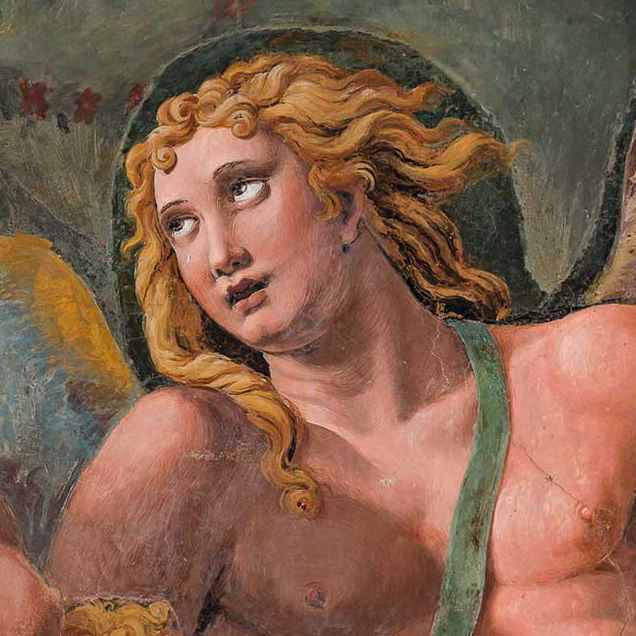Mantova, Palazzo Te: “Il banchetto nuziale di Amore e Psiche in un consesso di dei”. Nell’affresco di Giulio Romano riconoscono Vulcano, Zefiro, Apollo, Bacco, Sileno, Cerere e Giunone. Ispirandosi alla favola di Amore e Psiche, contenuta nelle Metamorfosi di Apuleio, Giulio Romano affrescò tutte le pareti di questa magnifica sala, giustamente detta “di Psiche”, a Palazzo Te a Mantova tra il 1526 e il 1528. I dipinti gli furono commissionati da Federico II Gonzaga, duca di Mantova, per celebrare in questa residenza di campagna, dedicata al riposo e al piacere, il suo amore clandestino con Isabella Boschetti. Sulla parete meridionale, qui fotografata, è il banchetto nuziale che conclude le travagliatissime vicende dell’amore tra Psiche ed Eros: è una chiara allegoria degli amori del committente e, al tempo stesso, un auspicio. Psiche cioè l’Anima, ed Eros, l’Amore passionale, si uniscono finalmente in un sontuoso matrimonio benedetto da tutti gli dei. Il figlio che nascerà dalla loro unione, qui già raffigurato nel loro letto nuziale, si chiamerà Voluptas: il piacere perfetto che nasce dall’unione armoniosa di corpo e spirito.
Mantua, Te Palace: “The Wedding Banquet of Cupid and Psyche, in a Gathering of Gods”. In the fresco by Giulio Romano Vulcan, Zephyr, Apollo, Bacchus, Silenus, Ceres and Juno are represented among others. Giulio Romano, who was inspired by the story of “Cupid and Psyche” in Apuleius’ Metamorphoses, frescoed all the walls of the magnificent Psyche room in the Palazzo Te of Mantua between 1526 and 1528. The paintings were commissioned by Federico II Gonzaga, Duke of Mantua, to celebrate his clandestine love with Isabella Boschetti in this country residence, dedicated to rest and pleasure. On the Southern wall, here photographed, you can see the wedding banquet that concludes the troubled vicissitudes of the love between Psyche and Eros: it is a clear allegory of the client’s love affairs and, at the same time, a wish. Psyche, that is the Soul, and Eros, that is passionate Love, finally join together in a sumptuous marriage blessed by all the gods. The son, who will be born from their union, is here already portrayed in their wedding bed. He will be called Voluptas: he represents the perfect pleasure that originates from the harmonious union of body and spirit.
